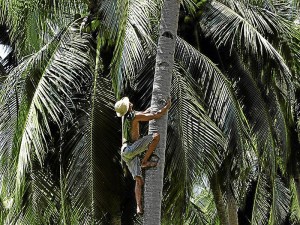Privatization of coco levy funds underway
MANILA, Philippines–President Aquino has signed two Executive Orders (EO) that would pave the way for the privatization of the coco levy funds, specifically shares in United Coconut Planters Bank (UCPB), San Miguel Corp. (SMC) and Coconut Industry Investment Fund (CIIF) Oil Mill Group.
The President ordered that the funds from the sale of the coco levy assets be used to improve coconut farm productivity, boost coconut farmers’ income, strengthen coconut farmers’ organization, and ensure a balanced, sustainable growth of the coconut industry.
Presidential Commission on Good Government (PCGG) chair Andres Bautista said the signing of the EOs would pave the way for the long-awaited sale of UCPB, which has drawn the interest of potential bidders such as Philippine National Bank, East West Banking Corp., BDO Unionbank Inc., Union Bank of the Philippines and China Banking Corp.
“A law will also be passed to complement the EOs. These EOs are supposed to jump-start the process,” said Bautista. “We are looking to move things forward so the funds can finally be used for the benefit of farmers and the coconut industry.”
The coco levy refers to taxes or contributions collected during the martial law years from coconut farmers, planters and millers by businessman Eduardo “Danding” Cojuangco Jr., uncle of President Aquino. The coco levy was used to purchase UCPB, six coconut oil mills, 14 holding companies, and SMC.
The coco levy shares in these companies were sequestered by the President’s mother, the late Corazon Aquino, in 1986. In 2013, the Supreme Court ruled the the coco levy shares being claimed by Cojuangco were owned by the government as the levy funds were in the nature of taxes for the sole use of the coconut industry.
The President signed E0 179 which laid down the guidelines for the inventory and privatization of coco levy assets. The President also signed EO 180 providing administrative guidelines for the reconveyance and utilization of the coco levy assets for the benefit of the coconut farmers, the development of the coconut industry, and for other purposes.
EO 179 mandates the PCGG, with the help of the Office of the Solicitor-General, to identify and account for all known coco levy assets in the next 60 days, whether surrendered or sequestered.
The PCGG will map out the ownership structure of corporations that were formed using the coco levy and the investments they made, and bare the money, assets and investments of the CIFF companies and their holding firms.
The order specified three main coco levy assets for disposition—UCPB shares to be determined by the government; shares in the CIIF and its holding firms; and 5.5 million shares held by the PCGG since March 1999.
The President also ordered the dissolution of the CIIF companies.
EO 180 mandates the Governance Commission for GOCCs (GCG), in consultation with the Finance Secretary, the Presidential Assistant for Food Security and Agricultural Modernization, and Philippine Coconut Authority, to find ways to dispose of the non-cash assets of the coco levy fund. The Privatization and Management Office has been designated the main disposition body.















